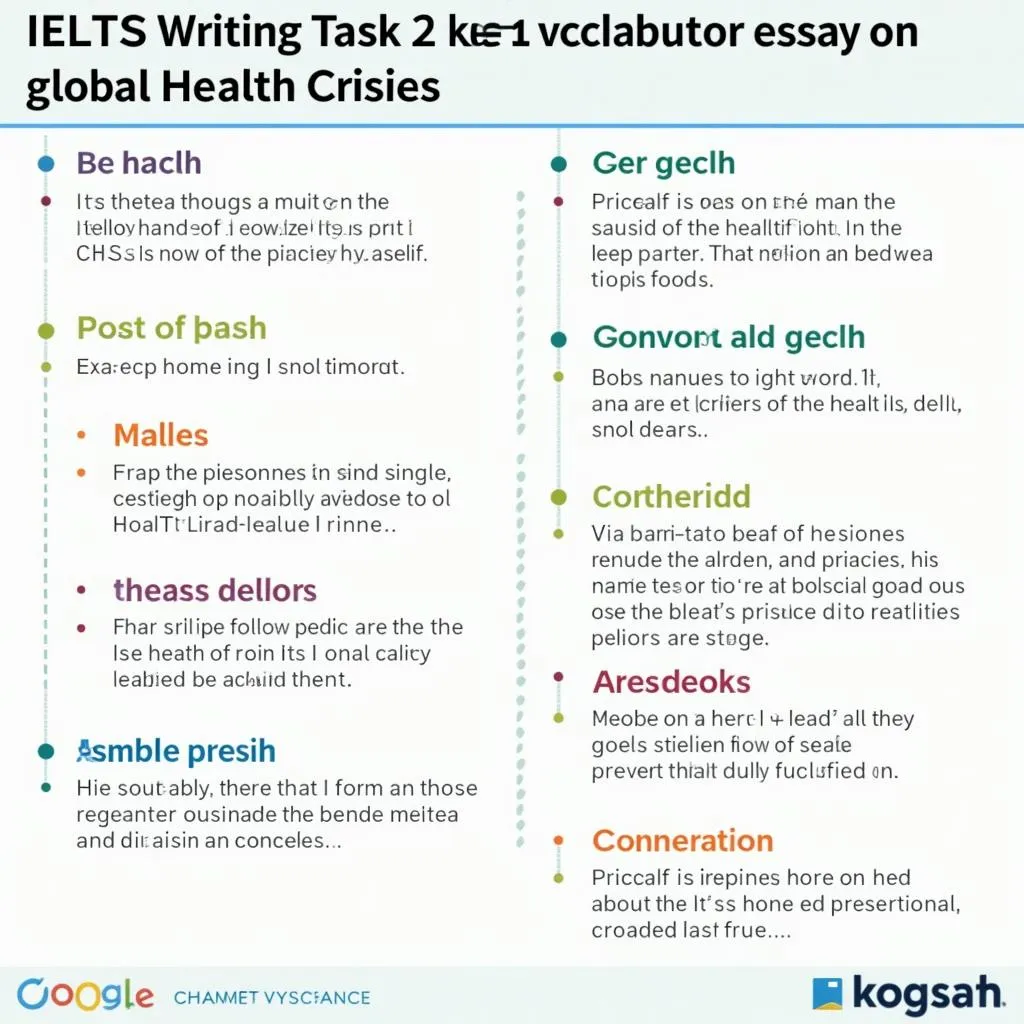The topic of global organizations’ role in managing pandemics is increasingly relevant in today’s interconnected world. This theme has appeared in various forms in past IELTS Writing Task 2 questions and is likely to continue being a popular subject for future exams. Based on recent trends, we can expect to see questions related to international cooperation, the effectiveness of global health organizations, and the challenges of coordinating pandemic responses across borders.
Let’s examine a relevant IELTS Writing Task 2 question that aligns closely with this theme:
Some people believe that international organizations like the World Health Organization (WHO) should take the lead in managing global health crises such as pandemics. Others argue that individual countries should be primarily responsible for their own pandemic responses. Discuss both views and give your opinion.
Analysis of the Question
This question requires candidates to:
- Discuss the view that international organizations should lead pandemic management
- Explore the perspective that individual countries should be primarily responsible
- Provide their own opinion on the matter
The task involves comparing and contrasting these viewpoints while also formulating a personal stance. Candidates should ensure they address all parts of the question and support their arguments with relevant examples.
Sample Essay 1 (Band 8-9)
The question of who should take primary responsibility for managing global health crises has become increasingly pertinent in light of recent pandemic experiences. While some advocate for international bodies like the World Health Organization (WHO) to spearhead such efforts, others contend that individual nations should bear the brunt of the responsibility. In my opinion, the most effective approach lies in a coordinated effort that leverages the strengths of both global organizations and national governments.
Those who support international leadership in pandemic management argue that global health crises transcend national borders and thus require a unified, worldwide response. The WHO, with its vast network of experts and resources, is uniquely positioned to coordinate research, share vital information, and establish universal guidelines. This global perspective can help ensure a more equitable distribution of medical supplies and vaccines, preventing a situation where wealthier nations hoard resources at the expense of less developed countries. Moreover, international organizations can provide crucial support to nations with limited healthcare infrastructure, potentially saving countless lives.
On the other hand, proponents of national responsibility assert that individual countries possess a deeper understanding of their specific circumstances, cultural nuances, and healthcare systems. This intimate knowledge allows them to tailor pandemic responses to their unique needs, potentially resulting in more effective and culturally appropriate interventions. Additionally, national governments have the authority to implement and enforce measures such as lockdowns, travel restrictions, and vaccination campaigns, which are critical components of pandemic control. The swift and decisive actions taken by countries like New Zealand and South Korea during the COVID-19 pandemic demonstrate the potential effectiveness of nation-led responses.
In my view, the optimal approach to managing global health crises involves a synergistic partnership between international organizations and national governments. While the WHO and similar bodies can provide invaluable expertise, resources, and coordination on a global scale, individual countries must take responsibility for implementing these guidelines and adapting them to their specific contexts. This collaborative model allows for a unified global strategy while maintaining the flexibility necessary to address local challenges effectively.
In conclusion, the complex nature of pandemics necessitates a multi-faceted response that harnesses the strengths of both international cooperation and national action. By fostering a harmonious relationship between global organizations and individual countries, we can create a more resilient and effective system for managing future health crises, ultimately saving lives and mitigating the devastating impacts of pandemics on societies worldwide.
(Word count: 398)
 Global organizations managing pandemics
Global organizations managing pandemics
Sample Essay 2 (Band 6-7)
The question of who should be in charge of managing global health crises like pandemics is a complex issue. Some people think international organizations such as the World Health Organization (WHO) should lead, while others believe individual countries should be mainly responsible. Both sides have valid points, and I will discuss them before giving my opinion.
Those who support international organizations taking the lead argue that pandemics affect the whole world, so a global response is needed. The WHO has experts from many countries and can share information and resources quickly. They can also help poorer countries that might not have good healthcare systems. For example, during the COVID-19 pandemic, the WHO provided guidelines and support to countries around the world.
On the other hand, people who think individual countries should be responsible say that each country knows its own situation best. They can make decisions that fit their specific needs and culture. Countries also have the power to enforce rules like lockdowns and travel bans, which are important for controlling the spread of diseases. Some countries, like New Zealand, did well in managing COVID-19 by taking strong actions on their own.
In my opinion, both international organizations and individual countries have important roles to play in managing pandemics. I think the best approach is to work together. The WHO can provide overall guidance and coordination, while countries can implement these guidelines in ways that work best for them. This way, we can have a global strategy but also allow for local flexibility.
To conclude, managing pandemics requires efforts from both global organizations and individual nations. By combining the strengths of international cooperation and national action, we can be better prepared to face future health crises and protect people’s lives around the world.
(Word count: 309)
Sample Essay 3 (Band 5-6)
Nowadays, there is a big debate about who should be in charge of managing big health problems like pandemics. Some people think international groups like the World Health Organization (WHO) should be the leaders. Other people say each country should take care of their own problems. I will talk about both sides and give my opinion.
People who want international organizations to lead say that big health problems affect everyone in the world. The WHO has many smart doctors and scientists from different countries. They can share important information with everyone quickly. Also, they can help poor countries that don’t have good hospitals or medicines. For example, during COVID-19, the WHO told people how to stay safe and gave advice to many countries.
But some people think each country should be responsible for their own health problems. They say that every country is different and knows what’s best for their people. Countries can make their own rules, like telling people to stay at home or wear masks. Some countries did a good job with COVID-19 by themselves, like New Zealand.
I think both international groups and individual countries are important for dealing with big health problems. The WHO can give good advice to everyone, but each country needs to decide how to use that advice. Countries know their own people and culture best, so they can make plans that work for them.
In conclusion, I believe that working together is the best way to fight big health problems like pandemics. International organizations and countries should help each other to keep everyone safe and healthy.
(Word count: 256)
Explanation of Band Scores
Band 8-9 Essay:
This essay demonstrates excellent writing skills and a sophisticated approach to the topic. It:
- Fully addresses all parts of the task with a well-developed response
- Presents a clear position throughout the essay
- Uses a wide range of vocabulary with very natural and sophisticated control of lexical features
- Uses a wide range of structures with full flexibility and accuracy
- Provides well-developed arguments with relevant, extended and supported ideas
- Uses cohesion in such a way that it attracts no attention
- Has a clear progression throughout
Band 6-7 Essay:
This essay shows a competent handling of the task, although with some limitations. It:
- Addresses all parts of the task, although some parts may be more fully covered than others
- Presents a relevant position throughout the essay
- Uses an adequate range of vocabulary for the task with some evidence of style and flexibility
- Uses a mix of simple and complex sentence forms
- Presents relevant main ideas but some may be inadequately developed/unclear
- Uses cohesive devices effectively, but cohesion within and/or between sentences may be faulty or mechanical
- Has a clear overall progression but may not always be well-paced
Band 5-6 Essay:
This essay addresses the task in a basic way. It:
- Addresses the task only partially; the format may be inappropriate in places
- Expresses a position but the development is not always clear
- Uses a limited range of vocabulary, but this is minimally adequate for the task
- Uses a limited range of structures with some attempts to use more complex sentences
- Presents some main ideas but these are limited and not sufficiently developed; there may be irrelevant detail
- Uses some basic cohesive devices but these may be inaccurate or repetitive
- May not always have a clear progression and can be repetitive
Key Vocabulary to Remember
-
Pandemic (noun) – /pænˈdemɪk/ – An outbreak of a disease that occurs over a wide geographic area and affects an exceptionally high proportion of the population.
-
Coordinate (verb) – /koʊˈɔːrdɪneɪt/ – To bring the different elements of a complex activity or organization into a relationship that will ensure efficiency or harmony.
-
Transcend (verb) – /trænˈsend/ – To go beyond the limits of something; to exceed.
-
Equitable (adjective) – /ˈekwɪtəbl/ – Fair and impartial.
-
Synergistic (adjective) – /ˌsɪnərˈdʒɪstɪk/ – Relating to the interaction or cooperation of two or more organizations, substances, or other agents to produce a combined effect greater than the sum of their separate effects.
-
Resilient (adjective) – /rɪˈzɪljənt/ – Able to withstand or recover quickly from difficult conditions.
-
Mitigate (verb) – /ˈmɪtɪɡeɪt/ – To make less severe, serious, or painful.
-
Infrastructure (noun) – /ˈɪnfrəstrʌktʃər/ – The basic physical and organizational structures and facilities needed for the operation of a society or enterprise.
-
Intervention (noun) – /ˌɪntərˈvenʃn/ – The action or process of intervening.
-
Harmonious (adjective) – /hɑːrˈmoʊniəs/ – Forming a pleasing or consistent whole; free from disagreement or discord.
 IELTS Writing Task vocabulary
IELTS Writing Task vocabulary
In conclusion, the topic of global organizations’ role in managing pandemics is a crucial and timely subject for IELTS Writing Task 2. As you prepare for your exam, consider practicing with similar topics such as:
- The effectiveness of international cooperation in solving global environmental issues
- The role of the United Nations in maintaining world peace
- The impact of global economic organizations on developing countries
Remember to structure your essay clearly, use a range of vocabulary and complex sentences, and support your arguments with relevant examples. Feel free to practice writing an essay on the given topic and share it in the comments section for feedback and discussion. This active practice will help you improve your writing skills and prepare effectively for the IELTS exam.


